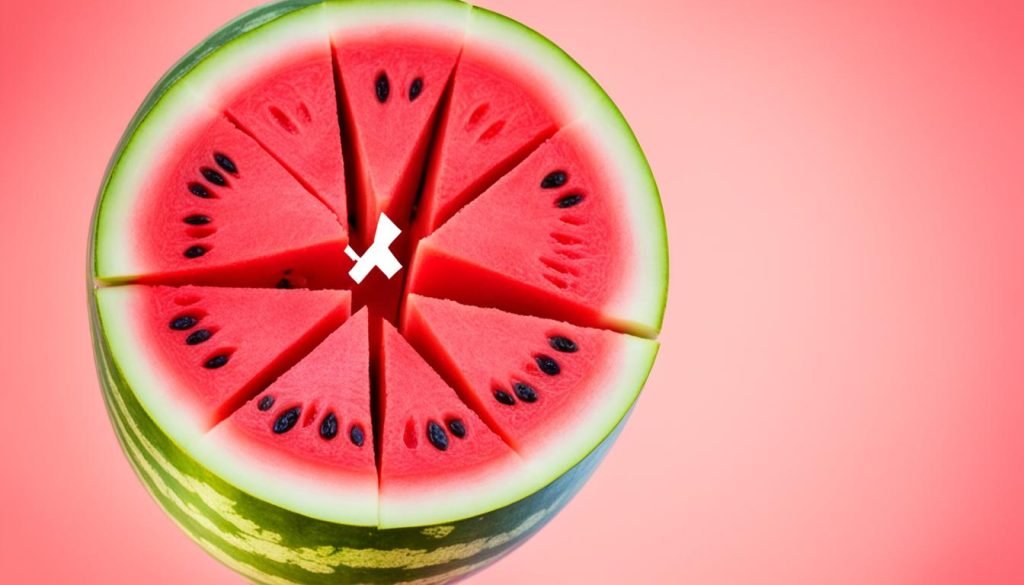Watermelon isn't just a tasty summer staple. It's also very good for you. It's filled with water and has very few calories. Plus, it has lots of vitamins, minerals, and antioxidants. Including watermelon in your healthy diet can be super helpful. But what changes if you eat it every day? Let's dive into the benefits and things to think about when consuming watermelon daily.
Key Takeaways
- Watermelon is a highly hydrating and low-calorie fruit that can be a great part of a healthy snacking routine.
- Watermelon is packed with essential vitamins, minerals, and antioxidants, including the powerful antioxidant lycopene.
- Regularly consuming watermelon may aid in weight management and provide disease-fighting benefits.
- Moderation is key, as excessive watermelon consumption can lead to digestive issues and blood sugar concerns for some individuals.
- Incorporating watermelon into a balanced, nutritious diet can be a great way to stay hydrated and reap the many health benefits of this refreshing fruit.
Watermelon's Nutritional Profile
Watermelon is packed with good vitamins, minerals, and antioxidants. A one-cup serving (152g) has just 45.6 calories, making it a great, low-calorie choice. It is also over 90% water, aiding in keeping you refreshed, especially in summer.
Rich in Vitamins and Minerals
Watermelon has lots of essential vitamins and minerals, including 15% of your daily vitamin C need. This helps your immune system and absorbs iron. It’s also full of vitamin A, vitamin B6, and potassium for skin, eyes, and more.
Abundant in Lycopene
Watermelon is rich in lycopene, making it red and acting as a powerful antioxidant. Lycopene can lower cancer and heart disease risks. It protects cells, lowers blood pressure, and fights inflammation.
Eat Watermelon Every Day
Eating watermelon every day can keep you well-hydrated, especially in summer. It's more than 90% water. This means it refreshes you and replaces fluids lost due to sweating. Nutritionists suggest adding a bit of salt to your watermelon. This is after a workout to boost electrolyte and carbohydrate levels. Watermelon's high water content makes it an excellent choice for a snack in hot weather.
Potential Weight Management Aid
Research shows watermelon might help with weight management. It's a low-calorie fruit but keeps you full with its high water content. This may cut down on unhealthy snacking. One study found that people who chose watermelon over low-fat cookies felt fuller. This led to weight loss and smaller waistlines over time.
Disease-Fighting Properties
Watermelon is packed with antioxidants, vitamins, and minerals. These can lower your disease risk. Lycopene in watermelon may reduce cancer and improve heart health. Plus, watermelon’s potassium and vitamin C can lower blood pressure and fight inflammation. This helps the immune system and cuts the risk of diseases like heart problems and diabetes.

Potential Side Effects of Excessive Watermelon Consumption
Watermelon is good for you, but too much can cause problems. This is especially true for those with sensitive stomachs. It's a high FODMAP fruit, which means it's tough to digest because of its short-chain carbs. Eating too much can lead to bloating, gas, and discomfort, especially for those with irritable bowel syndrome (IBS) or other tummy troubles. Remember, eating it in small amounts is the smart move to avoid these issues.
Digestive Issues
Watermelon has a lot of water and fiber, which can be hard on some people's stomachs. This can cause bloating and discomfort. People with IBS and other digestive issues might feel this more because of watermelon's high FODMAP content. Controlling your portion size and knowing what your stomach can handle is key. This can help ease digestive problems.
Blood Sugar Concerns
Watermelon can also affect blood sugar levels because it has a high glycemic index. This means it can make blood sugar rise quickly. For most people, a regular serving is fine. But, those with diabetes or who watch their carbs should be careful. They should eat it as part of a balanced diet.

Conclusion
Watermelon is not just tasty; it's also good for you. It's especially nice to have in summer. This fruit is mostly water but is packed with good nutrients like vitamins and minerals. There's also something called lycopene in it, which is a strong antioxidant that fights diseases.
But, watermelon might not sit well with everyone. For some, it could cause stomach or blood sugar troubles. This is more likely if you already have certain health issues like irritable bowel syndrome or diabetes. So, it's wise to eat watermelon in small amounts and mix it with other fruits and veggies. This way, you get its benefits without any bad effects.
Adding watermelon to your diet is a fun and wise choice. It helps keep you hydrated and supports your health. Like all foods, eating it in moderation is key. Also, pay attention to how your body reacts to it. This ensures you enjoy watermelon safely as part of your meals.
FAQ
What are the health benefits of eating watermelon daily?
Watermelon is a nutritious fruit that can bring you many health advantages if eaten often. It is low in calories and high in water, keeping you hydrated. With essential vitamins, minerals, and lycopene, it's a great choice.
How does the high water content in watermelon benefit the body?
Watermelon is more than 90% water, making it perfect for staying hydrated. Eating it after a workout with salt can replace lost electrolytes. This is very beneficial, especially in the summer.
Can eating watermelon daily aid in weight management?
Eating watermelon daily might benefit you in managing your weight. Being low in calories and rich in water, it can help you feel full. This might reduce the urge to snack on unhealthy, high-calorie foods.
What are some of the disease-fighting properties of watermelon?
Watermelon's antioxidants, vitamins, and minerals can help lower health risks. Lycopene, found in watermelon, is associated with lower cancer risks and better heart health.
Are there any potential side effects of eating too much watermelon?
But eating too much watermelon could have some side effects, especially for those with sensitive digestion. It's high in FODMAPs, leading to bloating, gas, and diarrhea in some. Overeating can also affect blood sugar levels.
Source Links
- https://www.healthline.com/nutrition/watermelon-side-effects
- https://health.clevelandclinic.org/benefits-of-watermelon
- https://www.nwhealth.edu/news/11-top-watermelon-health-benefits/
Recent Posts
It's important to evaluate whether Beachbody On Demand continues to meet your fitness needs as we enter 2025. With a range of workout programs and nutrition plans, the platform claims to cater to...
Just like having a personal trainer at your fingertips, Beachbody On Demand offers you an extensive library of on-demand workout programs accessible anytime, anywhere. This service allows you to...

